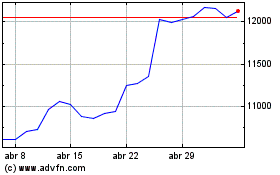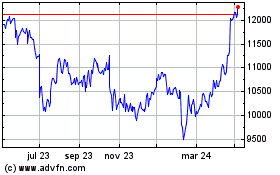By Stacy Meichtry and Bojan Pancevski
PARIS -- Europe's reluctance to distribute millions of doses of
AstraZeneca PLC's Covid-19 vaccine is coming under pressure after
the French government authorized use of the shot for some older
people.
The French government announced it would allow people with
comorbidities between the ages of 65 and 74 to receive the vaccine
developed by Oxford University and AstraZeneca. New data from the
U.K. on Monday showed just one dose of the vaccine was effective in
preventing disease and deaths among adults aged 70 and older who
had received it.
France's move was a sharp departure from a month ago when
President Emmanuel Macron told reporters that the vaccine was quasi
ineffective for people older than 65 years, without providing
evidence to back up his claim. The comments helped sow doubts
across the European Union that still persist.
Germany, Italy and other large European countries continue to
restrict older people from receiving AstraZeneca's vaccine, citing
a lack of data about its efficacy with that age group. And France's
restrictions remain in place for older people without
comorbidities.
The result: Doses of the company's vaccine have piled up as
European governments refuse to distribute the shots to younger
people until older cohorts and people with priority, such as
medical staff, have received a vaccine.
France has administered only a quarter of the 1.6 million shots
it began receiving from AstraZeneca last month, according to French
officials. Italy has used only 26% of its supply while Spain has
administered 43% of its shots.
In Germany, which has used less than a third of its nearly 1.5
million AstraZeneca doses, some states such as Bavaria and Saxony
have decided to donate doses to neighboring countries badly hit by
the virus instead of letting them languish in storage.
"Too many vaccines are still laying around in the refrigerators,
" said German Health Minister Jens Spahn said last week.
The restrictions on administering the AstraZeneca vaccine risk
undercutting a major plank in the continent's plans to accelerate a
rollout that has been slow compared with the U.S. and U.K.
So-called mRNA vaccines developed by Moderna Inc. and the alliance
of Pfizer Inc. and BioNTech SE are in limited supply in Europe.
They also have storage requirements that are colder than the
AstraZeneca vaccine, making them harder to administer in pharmacies
and other accessible locations.
In March, France plans to administer a total of six million
shots -- more than half of them coming from AstraZeneca. About
three million people, less than 5% of France's population, have so
far have received a single dose of any vaccine.
In the U.K., where AstraZeneca's vaccine has been widely
deployed, more than 20 million people, or 30% of its population,
have received at least one vaccine shot. That has allowed the
government to lay out step-by-step plans for an almost complete
reopening of its economy by June 21. Hospitalizations and deaths
among older people, the first to get vaccinated, have begun to fall
significantly more rapidly than among the unvaccinated
population.
Canada's government on Monday recommended the Oxford-AstraZeneca
shot be given to adults regardless of age, going against the
recommendation of a national vaccine-advisory committee that
earlier Monday had cited insufficient data about the shot's
effectiveness in older people. Canadian government officials said
they considered the shot safe and effective for adults of all
ages.
A test for the vaccine is expected soon after late-stage human
trials wrap up in the U.S. AstraZeneca has said it expects results
from those trials -- with around 30,000 volunteers in the U.S.,
Chile and Peru -- by the end of this month, meaning a U.S. verdict
on the vaccine could come as soon as April.
Governments across Europe now face the challenge of overcoming
public skepticism toward the AstraZeneca vaccine. That has become
more ingrained in recent weeks as many younger healthcare workers
have publicly refused the company's vaccine because of concerns
over efficacy and reports of side effects.
Alain Fischer, an immunologist overseeing France's vaccination
campaign, publicly defended the vaccine's efficacy and safety last
week in an effort to turn the tide of public opinion.
"I find it deeply unjust," Dr. Fischer said. "This vaccine gets
relatively bad press in France."
AstraZeneca's European rollout stumbled the moment it left the
gates. On Jan. 29, the European Medicines Agency, the EU's drug
regulator, endorsed the vaccine's use in people 18 and older while
warning the shot hadn't been sufficiently tested in people over
55.
Earlier that day Mr. Macron met with a group of reporters inside
the Élysée Palace who questioned whether he was mistaken in backing
the EU's strategy of collectively procuring vaccine supplies
instead of going it alone like the U.K.
Mr. Macron, a longtime champion of the EU, fired back: "The real
problem with AstraZeneca is that it hasn't worked the way we
expected. Because we've had very little information." So far, he
said, "everything seems to indicate that it's quasi ineffective for
people older than 65 years old, some say 60 years and above."
Amid the confusion, national health authorities across the
continent began issuing their own guidance. Spain cut off access
for anyone older than 55 years. Italy restricted people 55 years
and up from receiving AstraZeneca's shot, saying they needed more
data for that age group, before bending to public pressure and
placing the restriction at 65 years and up.
Germany's standing vaccination committee, a panel of experts
that issues guidance on vaccination, went against the EMA's
guidance, recommending the shot only for people younger than 65.
The committee said it based the decision on the lack of trial data
about the vaccine's efficacy on the elderly, not because of any
doubt about its overall quality.
This week the German committee said it would reconsider its
original recommendation and possibly open the vaccine for general
use. The committee's chief, Thomas Mertens, said elderly people
could expect to receive the shot soon. The initial guidance wasn't
intended to criticize the vaccine itself, he said, adding: "The
whole thing somehow did not turn out that well,"
Jenny Strasburg in London and Giovanni Legorano in Rome
contributed to this article.
Write to Stacy Meichtry at stacy.meichtry@wsj.com and Bojan
Pancevski at bojan.pancevski@wsj.com
(END) Dow Jones Newswires
March 02, 2021 15:27 ET (20:27 GMT)
Copyright (c) 2021 Dow Jones & Company, Inc.
Astrazeneca (LSE:AZN)
Gráfica de Acción Histórica
De Mar 2024 a Abr 2024

Astrazeneca (LSE:AZN)
Gráfica de Acción Histórica
De Abr 2023 a Abr 2024
